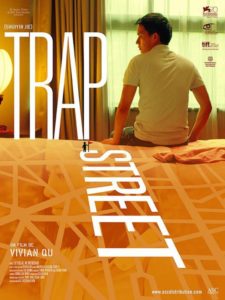Trap Street
水印街
China, 2013, colour, 1.85:1, 94 mins.
Director: Wen Yan 文宴 [Vivian Qu].
Rating: 5/10.
Mystery-drama about state snooping doodles around too much at a script level.
A city in central China, the present day. Li Qiuming (Lv Yulai) works as a trainee at digital-mapping company Hongtu Surveying, along with his senior, Zhang Sheng (Hou Yong). Li Qiuming, who shares a flat with two friends, also does work for them installing security systems. He occasionally visits his father (Zhao Xiaofei), a women’s magazine editor, and mother (Xiang Qun), who runs an arcade shop, to have a meal and repay a loan. One day at work in the street he spots an attractive young woman, and later he and Zhang Sheng give her a lift in the rain to a metro station. Next day, while cleaning their van, Li Qiuming finds a name-card holder she dropped on the floor and discovers her name is Guan Lifen (He Wenchao). Xie Bo (Liu Tiejian), a middle-aged man who says he is Guan Lifen’s supervisor, meets Li Qiuming to collect the holder and thank him on Guan Lifen’s behalf. Meanwhile, Li Qiuming has become interested in the fact that one road, Forest Street, doesn’t show up on GPS or his own company’s digital-mapping system. Taking a taxi there, he discovers a building called “Lab 203” and, returning there one night, sees Guan Lifen, who works there. They go for a drive in her car, and eventually start dating. Li Qiuming then finds he can no longer reach her by phone, though she does eventually turn up again. One day, however, he’s suddenly kidnapped by some men who start interrogating him and asking him what his interest is in Guan Lifen and Lab 203.
REVIEW
A low-key mystery that fails to develop its early promise into anything substantial, Trap Street 水印街 has a good feel for modern life and manners in urban China but squanders its cast on a script that doodles around before finally revealing itself as a woolly study of today’s surveillance society. This first feature by writer-director Wen Yan 文宴 [Vivian Qu], a member of China’s indie scene, is largely free of the affectations that plagued two films she earlier worked on the production side of – Night Train 夜车 (2007) by Diao Yi’nan 刁亦男 and Knitting 牛郎织女 (2008) by Yin Lichuan 尹丽川 – and has none of the self-conscious longueurs that so often shackles such fare. The film’s main problem is that Wen’s screenplay is dramatically disorganised, evoking no real mystery or interior tension, hopping around hither and thither, and having nothing original to say about the well-worn theme of state snooping other than the fact that it exists.
Aged 31 but looking younger, actor Lv Yulai 吕聿来, a familiar face in indie productions, cuts a livelier figure than in some of his previous movies (The Red Awn 红色康拜因, 2007; Knitting; Here There 这里 那里, 2012) and, as in Beijing Flickers 有种 (2012), isn’t just called upon to mope around. As the trainee surveyor who becomes fascinated by an apparently unmapped street and a girl who works at a shady site there – “Lab 203”, but better translated as “Office 203” – he pairs well with He Wenchao 何文超, 30, in their limited number of scenes together. He is both an interesting actress (supporting parts in Hua Yao Bride in Shangri-La 花腰新娘, 2005, and My Career As a Teacher 我的教师生涯, 2007) and a promising director in her own right (lesbian-crush drama Sweet Eighteen 甜蜜18岁, 2012), and brings a sense of maturity to her role as the mysterious object of the young man’s affection that benefits the movie as a whole. Unfortunately, the screenplay shuffles her around in an equally random, half-drawn way as several other characters, including Zhao Xiaofei and Xiang Qun as the parents. Apart from Hou Yong 侯勇 as the young man’s straight-talking colleague, only Liu Tiejian etches a strong personality, as the woman’s creepily smooth “supervisor”.
Technical credits are good on a modestly budgeted level, with experienced hands like editor Yang Hongyu 杨红雨 and sound man Zhang Yang 张阳. But the film has no consistent visual signature in the largely hand-held photography by Tian Li 田荔 (operator on several films by Jia Zhangke 贾樟柯) and Matthieu Laclau (editor on films like Mr. Tree Hello!树先生, 2011, and A Touch of Sin 天注定, 2013). A “trap street” is a fake street inserted into a map to protect copyright; the Chinese title literally means “Watermark Street”. The film was shot in Nanjing, central China.
CREDITS
Produced by 22 Hours Films (CN).
Script: Wen Yan [Vivian Qu]. Photography: Tian Li, Matthieu Laclau. Editing: Yang Hongyu. End title song: Zuoxiao Zuzhou. Art direction: Liu Qiang. Sound: Yamashita Aya, Si Zhonglin, Zhang Yang.
Cast: Lv Yulai (Li Qiuming), He Wenchao (Guan Lifen), Hou Yong (Zhang Sheng), Zhao Xiaofei (Li Qiuming’s father), Xiang Qun (Li Qiuming’s mother), Liu Tiejian (Xie Bo), Li Xinghong (interrogator), Liu Tong, Feng Shijie (Li Qiuming’s roommates), Wang Jiao (Jingjing), Jin Liao (restaurant owner), Sun Si (photoshop woman), Ma Guohua (Ma), Li Youliang (taxi driver), Kong Zhangxian, Lu Yonghui, Tao Lixin, Chen Guanghui (residents), Wang Wei, Wu Yang, Wang Zhong, Zhang Lekun, Cai Yalu (surveyors), Cai Yinyu (sauna manager).
Premiere: Venice Film Festival (International Film Critics’ Week), 1 Sep 2013.
Release: China, tba.
(Review originally published on Film Business Asia, 3 Sep 2013.)
